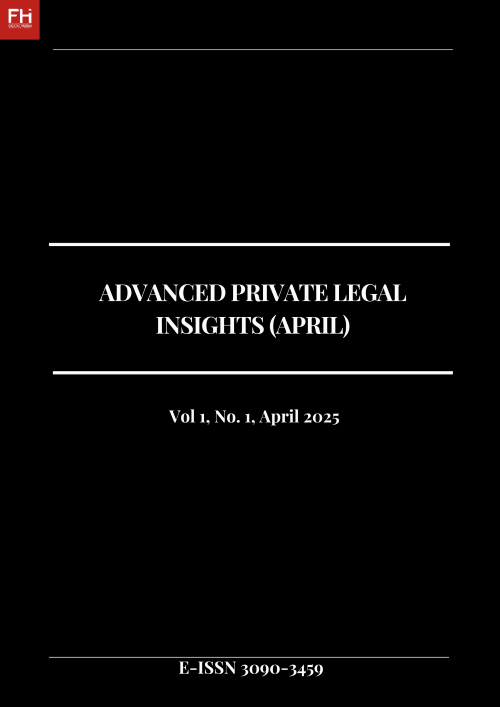Legal Analysis Of Telephone Conversation Recordings As Evidence In Civil Disputes
DOI:
https://doi.org/10.56087/6k76ny02Keywords:
Recording of Conversations, Evidence, Civil DisputesAbstract
This study aims to determine and analyze the validity of telephone conversation recordings as evidence in civil disputes. This research was conducted using the Normative research method, also called doctrinal legal research, which is often conceptualized as what is written in laws and regulations or law is conceptualized as a rule or norm that is a benchmark for human behavior that is considered appropriate. The results of this study are that telephone conversation recordings can be strong evidence in civil disputes as long as they are obtained legally, do not violate privacy rights, and are accountable for their authenticity. The legal force of electronic evidence in civil cases basically depends on how the evidence can be verified and proven authentic in court. If the validity of electronic evidence can be proven, for example through expert witnesses or digital devices that can confirm its validity, then it can be considered with almost the same strength as written evidence in this case. However, in practice, electronic evidence often has a weaker position compared to letters in accordance with the provisions of the Civil Code, especially because electronic evidence can be more susceptible to forgery or manipulation.
References
[1] A. P. Buana, A. Aswari, M. F. Said, and M. Y. Arifin, “Responsibility Parking Service Business to The Protection Of Consumer Of The Parking Services in Makassar,” Subst. Justice Int. J. Law, vol. 1, no. 1, p. 23, 2018, doi: 10.33096/substantivejustice.v1i1.15.
[2] M. Komariah, “Pengawasan Bagi Orang Asing Yang Overstay di Indonesia Berdasarkan Undang-Undang Nomor 6 Tahun 2011 Tentang Keimigrasian,” J. Kaji. Huk., vol. 3, no. 1, pp. 450–466, 2018, [Online]. Available: https://core.ac.uk/download/pdf/196255896.pdf
[3] S. Yuniarti, “Perlindungan Hukum Data Pribadi Di Indonesia,” Bus. Econ. Commun. Soc. Sci. J., vol. 1, no. 1, pp. 147–154, 2019, doi: 10.21512/becossjournal.v1i1.6030.
[4] E. Priliasari, “PERLINDUNGAN DATA PRIBADI KONSUMEN DALAM TRANSAKSI E-COMMERCE MENURUT PERATURAN PERUNDANG-UNDANGAN DI INDONESIA (Legal Protection of Consumer Personal Data in E-Commerce According To Laws dan Regulations in Indonesia),” J. Rechts Vinding, vol. 12, no. 2, pp. 261–279, 2023.
[5] Setiawati Ns, “Perlindungan Hukum Terhadap Pemegang Polis Asuransi Dalam Menyelesaikan Sengketa Klaim Asuransi,” Spektrum Huk., vol. 15, no. 2, pp. 169–194, 2018.
[6] R. Habibunnajar and I. Rahmatullah, “Problematika Regulasi Pinjam Meminjam Secara Online Berbasis Syariah Di Indonesia,” J. Leg. Reason., vol. 2, no. 2, pp. 120–134, 2020, doi: 10.35814/jlr.v2i2.2225.
[7] Y. Dianti, “Analisis Penegakan Hukum Terhadap Tindak Pidana Ujaran Kebencian Melalui Media Elektronik,” Angew. Chemie Int. Ed. 6(11), 951–952., pp. 5–24, 2017, [Online]. Available: http://repo.iain-tulungagung.ac.id/5510/5/BAB 2.pdf
[8] A. Prawira Buana, H. Hasbi, M. Kamal, and A. Aswari, “Implikasi Pelaksanaan Perjanjian Jual Beli Telepon Seluler Ilegal (Black Market),” JCH (Jurnal Cendekia Hukum), vol. 6, no. 1, p. 117, 2020, doi: 10.33760/jch.v6i1.268.
[9] W. Fitri, “Pengaruh Integritas Perbankan Syariah Sebagai Sektor Keuangan Dalam Meningkatkan Perekonomian Indonesia Pada Masa Pandemi,” J. Komun. Huk., vol. 8, no. 1, pp. 317–333, 2022, doi: 10.23887/jkh.v8i1.44409.
[10] R. Moreno Chrishans and A. Corresponding, “Efektivitas Alternatif Penyelesaian Sengketa Sebagai Upaya Penyelesaian Sengketa Franchise (Waralaba),” J. Multiling., vol. 3, no. 3, pp. 1412–4823, 2023.
[11] S. Bisma, “Telaah tentang Perlindungan Hukum terhadap Anak dan Wanita,” Bisma, S. (1986). Telaah tentang Perlindungan Huk. terhadap Anak dan Wanita. 16(4), 90., vol. 16, no. 4, p. 90, 1986.
[12] N. Qamar et al., “Metode Penelitian Hukum (Legal Research Methods),” no. December, p. 176, 2017.
[13] I. D. S. Saimima and A. P. Rahayu, “Anak Korban Tindak Pidana Perundungan (Cyberbullying) Di Media Sosial,” J. Kaji. Ilm., vol. 20, no. 2, pp. 125–136, 2020, doi: 10.31599/jki.v20i2.102.
[14] H. S. Flora, “Modus Operandi Tindak Pidana Prostitusi Melalui Media Sosial Online,” J. Justiciabelen, vol. 2, no. 2, p. 120, 2022, doi: 10.35194/jj.v2i2.2115.
[15] P. Anabella, “Penanganan Ujaran Kebencian Oleh Kepolisian Negara Republik Indonesia Berdasarkan Surat Edaran No Se/06/X/2015 Tentang Penanganan Ujaran Kebencian,” JISIP (Jurnal Ilmu Sos. dan Pendidikan), vol. 5, no. 1, pp. 579–586, 2021, doi: 10.58258/jisip.v5i1.1785.
[16] W. J. A. Ningtyas and S. M. M. TVM, “Perlindungan Hukum Pemegang Polis Asuransi Dalam Menyelesaikan Sengketa Klaim Asuransi,” vol. 01, no. June, pp. 1–23, 2016.
[17] Yuyut Prayuti, “Dinamika Perlindungan Hukum Konsumen di Era Digital: Analisis Hukum Terhadap Praktik E-Commerce dan Perlindungan Data Konsumen di Indonesia,” J. Interpret. Huk., vol. 5, no. 1, pp. 903–913, 2024, doi: 10.22225/juinhum.5.1.8482.903-913.
[18] T. S. Ramli et al., “Prinsip Prinsip Cyber Law Pada Media Over the Top E-Commerce Berdasarkan Transformasi Digital Di Indonesia,” J. Legis. Indones., vol. 16, no. 3, pp. 392–398, 2019.
Downloads
Published
Issue
Section
License
Copyright (c) 2025 Yoga Pratama, Muhammad Arsy, Rizki Ramadani

This work is licensed under a Creative Commons Attribution-ShareAlike 4.0 International License.


